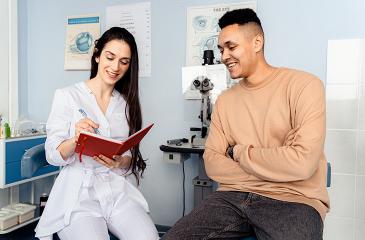Language is a powerful tool. Not only as a form of expression, it can also be used to heal or harm.
In the context of healthcare settings, before a clinician even enters a room their perception of a patient is shaped by language in notes. There is a difference between “a patient declined” versus “a patient refused.” The words we choose impact our bias. The patient described using the latter phrase is more likely to be labeled as difficult, which may impact provider-patient interaction and follow-up in care.
Language can also shift responsibility. Take for example the sentence, “Speakers of languages other than English were more likely to delay their vaccine,” versus, “Speakers of languages other than English were more likely to experience delays to vaccination.” Rather than criticizing patients, the second statement is a critique of structural barriers and inequitable systems.
All of these examples are from the National Resource Center for Refugees, Immigrants, and Migrants (NRC-RIM), a program of the Center for Global Health and Social Responsibility (CGHSR) established in 2020 as part of CGHSR’s ongoing collaboration with the CDC and the International Organization for Migration. NRC-RIM works with organizations serving RIM communities that are disproportionately impacted by health inequities and aims to strengthen partnerships between health departments and communities.
We know that structural determinants of health are influential in health outcomes, but what about language as a structural determinant of health? Changing the words we use has policy, public health and clinical implications.
Imagine talking about people like they are sitting next to you in a room, how would that change the way you spoke about them? Language has a powerful influence on how we think about and value people. It is a way to humanize patients, grounded in dignity and respect, and improve health outcomes.
Driving Innovation & Discovery
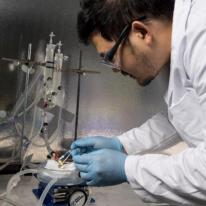
Researchers Perform First Successful Transplant of Functional Cryopreserved Rat Kidney
In a groundbreaking new study, engineers and medical researchers at the U of M Twin Cities have proven the life-saving potential of long-term organ preservation at ultra-low temperatures by successfully transplanting a rewarmed kidney in a rat and restoring full kidney function. The research, published in Nature Communications, has the potential to save thousands of human lives by enabling long-term storage of organs for transplantation.
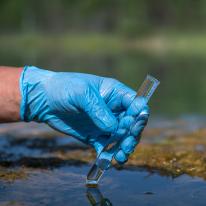
Ensuring Clean Water and Sanitation, Addressing Climate Change, and Improving Sustainable Communities via Predictive Wastewater Treatment in Rural Communities
Wastewater treatment protects the environment and human health. Conventional wastewater treatment is energy-intensive and complex, making it impractical for rural and under-resourced communities. With support from OACA, Paige J. Novak, PhD, is leading a study on wastewater treatment that could help us advance understanding of a treatment process that could enable much broader successful deployment of sanitation while protecting surface water from excess nitrogen pollution.
Advancing Interprofessional Education & Training

Join the Center for Interprofessional Health and Your Colleagues in Practice in the New WILD Series
The upcoming WILD Series (Workplace Interprofessional Learning & Development) continuing education offering will focus on roles and responsibilities. Participants build interprofessional skills as a preceptor and health professional through five actionable weekly emails and a one-hour group debriefing session, which is a chance to learn with, from, and about colleagues from a myriad of health professions. Registration deadline is July 20.
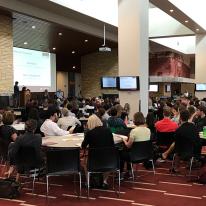
You’re Invited to be a Featured Guest Health Professional for IPE Sessions
The 1Health Interprofessional Education Program invites practicing health professionals to join them as a featured guest health professional for the University's introductory interprofessional educational sessions this fall, “Better Together: Preparing for Collaborative Practice.” They are looking for a variety of practicing health professionals to facilitate interactive discussions with health professional students. Your role would be to share your valuable professional perspective and experience with collaborative practice with two small, interprofessional groups of students.

Designing Interactive Lectures
This toolkit is designed to provide instructors with ideas, examples, and guidelines to transform lectures into interactive and engaging learning experiences that will facilitate learners' achievement of intended learning outcomes. Whether you are faculty or staff teaching about aging or geriatrics, this brief program explains ways to incorporate active learning techniques (ALTs)—which have been associated with better learning outcomes—into your lectures. ALTs engage students in learning new or updated content and in applying what they have learned regardless of the setting-classroom, online or clinical settings.
Partnering with Communities
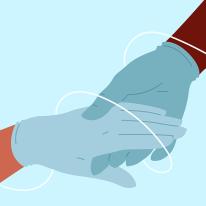
Bringing Healthcare Services to People Who Most Need Them
Susan Molina, a medical student, became interested in mobile health for the unique opportunity to bring healthcare services to communities in need. Molina chose to volunteer with the Mobile Health Initiative for the chance to work closely with different communities in the larger Minnesota area. "Transportation, difficulty arranging times for visiting healthcare facilities, and other barriers keep many individuals from seeking timely and necessary medical care," said Molina. "The Mobile Health Initiative helps bridge a gap in some of these barriers by bringing services to people who most need it."
U-Wide Events and Opportunities

The 1st Conference of Magnetic Technologies and Clinical Applications in Neuroscience
This conference will concentrate on the latest developments in magnetic and spintronic devices and systems, with a particular emphasis on their potential applications in neural stimulation and sensing, diagnosis and treatment of neurological disorders, and brain-inspired technologies. Register by Aug. 1 for an early bird discount.

Fall 2023 Teaching Enrichments Series
The Center for Educational Innovation invites the entire teaching community across the University to participate in sessions focused on strategies that you can implement in your courses this semester. All sessions are delivered online via Zoom.
